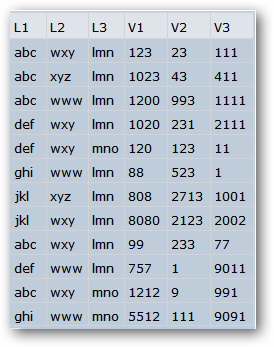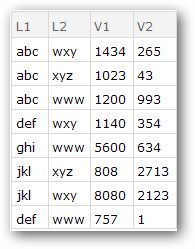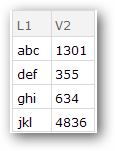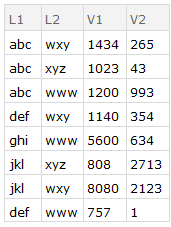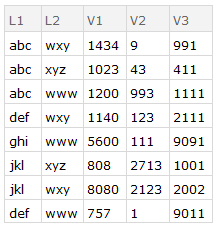I often need to sum values in a list of Associations according to some columns in that Association. I have a way of doing it, which will be the main part of this question, but it seems awkward. I'm hoping that there's a simpler way to do this. Perhaps even one that would allow me to create a generic function I can use in a number of projects.
Can anyone suggest a less awkward way of doing this?
a1 = {
<|"L1" -> "abc", "L2" -> "wxy", "L3" -> "lmn", "V1" -> 0123, "V2" -> 0023, "V3" -> 0111|>,
<|"L1" -> "abc", "L2" -> "xyz", "L3" -> "lmn", "V1" -> 1023, "V2" -> 0043, "V3" -> 0411|>,
<|"L1" -> "abc", "L2" -> "www", "L3" -> "lmn", "V1" -> 1200, "V2" -> 0993, "V3" -> 1111|>,
<|"L1" -> "def", "L2" -> "wxy", "L3" -> "lmn", "V1" -> 1020, "V2" -> 0231, "V3" -> 2111|>,
<|"L1" -> "def", "L2" -> "wxy", "L3" -> "mno", "V1" -> 0120, "V2" -> 0123, "V3" -> 0011|>,
<|"L1" -> "ghi", "L2" -> "www", "L3" -> "lmn", "V1" -> 0088, "V2" -> 0523, "V3" -> 0001|>,
<|"L1" -> "jkl", "L2" -> "xyz", "L3" -> "lmn", "V1" -> 0808, "V2" -> 2713, "V3" -> 1001|>,
<|"L1" -> "jkl", "L2" -> "wxy", "L3" -> "lmn", "V1" -> 8080, "V2" -> 2123, "V3" -> 2002|>,
<|"L1" -> "abc", "L2" -> "wxy", "L3" -> "lmn", "V1" -> 0099, "V2" -> 0233, "V3" -> 0077|>,
<|"L1" -> "def", "L2" -> "www", "L3" -> "lmn", "V1" -> 0757, "V2" -> 0001, "V3" -> 9011|>,
<|"L1" -> "abc", "L2" -> "wxy", "L3" -> "mno", "V1" -> 1212, "V2" -> 0009, "V3" -> 0991|>,
<|"L1" -> "ghi", "L2" -> "www", "L3" -> "mno", "V1" -> 5512, "V2" -> 0111, "V3" -> 9091|>};
a2 = Dataset[a1]
a3 = a2[GroupBy[{#L1, #L2} &], Total, {"V1", "V2"}];
a4 = Normal[Values[a3]];
a5 = Normal[Keys[a3]];
a6 = AssociationThread[{"L1", "L2"} -> #] & /@ a5;
a7 = MapThread[Join, {a6, a4}];
Dataset[a7]
a3 = a2[GroupBy[{#L1} &], Total, {"V2"}];
a4 = Normal[Values[a3]];
a5 = Normal[Keys[a3]];
a6 = AssociationThread[{"L1"} -> #] & /@ a5;
a7 = MapThread[Join, {a6, a4}];
Dataset[a7]

